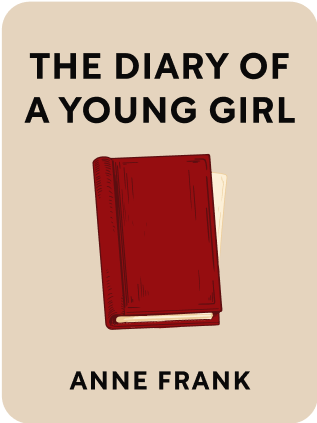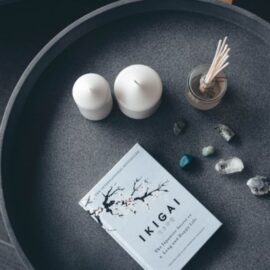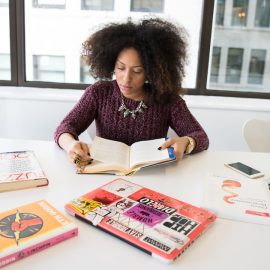

This article is an excerpt from the Shortform book guide to "The Diary of a Young Girl" by Anne Frank. Shortform has the world's best summaries and analyses of books you should be reading.
Like this article? Sign up for a free trial here .
Are you looking for Anne Frank’s diary quotes? What did Anne think about her life in the Secret Annex?
Anne Frank was a young Jewish girl who lived and died during WWII. She documented her life in hiding in her diary, which was published by her father Otto Frank after the war ended. The following Anne Frank’s diary quotes demonstrate just how much wiser and more mature she has become since going into hiding.
Here are some of Anne Frank’s diary quotes to think about.
Quotes From Anne Frank’s Diary
“I look back at that Anne Frank as a pleasant, amusing, but superficial girl, who has nothing to do with me.”
In the first Anne Frank’s diary quotes, she reflects on how much she has changed since going into hiding. When she just started writing in her diary, she wrote about the superficial frustrations of an average thirteen-year-old girl such as deciding who her best friend was and figuring out which boys liked her. Having gone through the trauma of extended confinement in the Annex, her late diary entries became much wiser and much more mature. For example, she began to philosophize about a variety of topics, ranging from pianists to liberation movements:
- Anne enjoyed talking about famous figures. For example, she talked about the life of famed pianist Franz Liszt and his flings with a variety of women. She believed he was a true artist who cared about his creations as much as his cognac.
- As the Allies advanced towards Amsterdam, a pocket of the Dutch population began to spew anti-British sentiments. They didn’t want to be occupied by another world power and expected the British to liberate them then leave. Anne didn’t agree with these sentiments. She believed that the British were going above and beyond their responsibilities as allies and that the Dutch should be grateful for the Allied assistance.
- The longer Anne was isolated in the Annex, the more she fell in love with nature. She desperately wanted to be back in the world and went out of her way to catch glimpses of trees, the moon, and other images of nature. Looking to nature helped her feel calm and hold onto hope for eventual freedom.
- Anne questioned the place of women in society. She hated that women were viewed as inferior to men and were expected to carry out “wifely duties” instead of developing a life for themselves. She appreciated that some countries had begun to give women more rights and educational opportunities, but she believed that the stigma against women was still alive and well.
- After Peter joked about becoming a criminal, Anne thought about the nature of morality and ambition. She believed that everyone had the ability to stay true to their convictions if they worked hard enough, and she hoped that everyone would take the time to make choices based upon their views of “right and wrong.” She also believed that everyone needed to have goals that they worked towards because, without goals, she thought people would become lazy and search for the “easiest” way to live.
- When reflecting on the way that she had been raised, Anne developed some opinions about child-rearing. She believed that children had to be taken seriously and treated as individuals. She hated when her parents would tell her that she’d “grow out of it” or relate her experiences to “other girls.” Also, she believed that, while parents could guide their kids in a certain direction, children had to make discoveries about their goals and morality for themselves.
- Anne believed that the younger residents in the Annex had a more difficult time than the adults. This is because the adults had time to develop opinions and convictions in a more normalized world. On the other hand, the younger residents had to find their beliefs and dreams while faced with the grim realities of war and isolation.
- In her final diary entry, Anne talked about the two sides of her personality. She felt like a walking contradiction with one side of her being more sarcastic and carefree while the other side wanted deeper and more meaningful connections. She was afraid that people would mock her if she showed her more vulnerable side, and she only let that part of her personality emerge when she was alone.
“I don’t think I’ll ever feel at home in this house, but that doesn’t mean I hate it. It’s more like being on vacation in some strange pension. Kind of an odd way to look at life in hiding, but that’s how things are. The Annex is an ideal place to hide in. It may be damp and lopsided, but there’s probably not a more comfortable hiding place in all of Amsterdam.”
This is one of Anne Frank’s diary quotes where she expresses her gratitude for having a place to hide during the Nazi occupation. She’d often think about the hardships of the people who were facing the Nazi threat directly and felt grateful that she was able to avoid that fate at the time. She compared her experience in the Annex to the people still out on the street:
- Where she had a quiet and safe place to live, others were being torn out of their homes and either sent to camps or left homeless.
- Where she had clothing and food, others were left in the cold with only a thin shirt and no way to get resources.
- Where she and her family could think about “after the war,” many were trying to survive on a day-to-day basis.
“I continued to sit with the open book in my hand and wonder why I was filled with so much anger and hate that I had to confide it all to you.”
In this Anne Frank’s diary quotes, she admits that she was too harsh in her depiction of her mother in her old diary entries. Her perspective on her mother started to change and she tried to have sympathy for her because she didn’t believe that her father loved her mother initially. She believed that her mother was never truly happy because she knew that she’d never have all of her husband’s affection.

———End of Preview———
Like what you just read? Read the rest of the world's best book summary and analysis of Anne Frank's "The Diary of a Young Girl" at Shortform .
Here's what you'll find in our full The Diary of a Young Girl summary :
- What Nazi occupation looked like from the perspective of a young Jewish girl
- How Anne Frank had some normal teenage experiences while in hiding
- How the hidden residents coped with the stress






